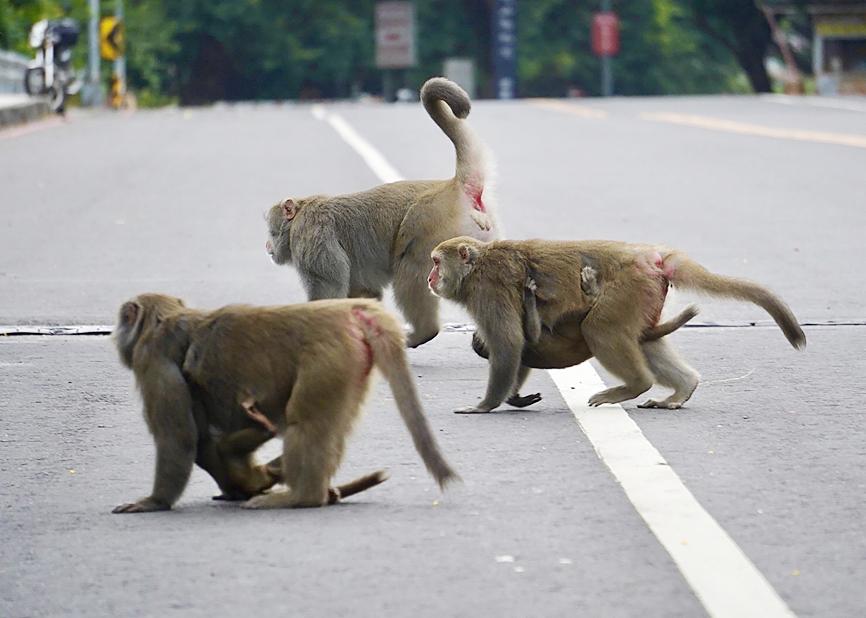Ownership of Formosan rock macaques is to be banned from next month, with owners required to forfeit or register such pets by March, the Council of Agriculture said yesterday.
The macaque would be added to a list of animals prohibited from ownership, importation or exportation, effective on Sept. 1 at the earliest, the council said.
Those who legitimately obtained such animals prior to the rules going into effect would be allowed to microchip and register them with their local agriculture department before March next year, or face a fine of NT$50,000 to NT$250,000 and confiscation of the animal, Department of Animal Industry Deputy Director Chiang Wen-chuan (江文全) said.

Photo: CNA
Macaques are not suitable as pets because they are naturally sociable animals and are prone to transmitting dangerous diseases to humans, Chiang said.
Forestry Bureau data show that there were 12 registered macaques in captivity as of Sept. 1, 2020.
When asked to report how many had been registered as of Monday, municipalities listed seven, three of which were in government care, Chiang said.
However, animal rights advocates believe there are far more macaques being raised illegally than the official numbers suggest.
A study by the Environment and Animal Society of Taiwan found more than 150 reports of macaques being kept in captivity since they were removed from the protected animal list in January 2019.
They were mostly rescues or captured to protect crops, but some baby macaques are also sold as pets for as much as NT$20,000, Environment and Animal Society deputy director Chen Yu-min (陳玉敏) said.
After they were removed from the list, many people thought they were allowed to keep macaques in captivity, Association for Coexistence with Macaca Cyclopis secretary-general Lin Mei-yin (林美吟) said.
Some have been kept in horrible conditions with small cages or forced to interact with visitors, Lin said, adding that she has even heard reports of owners withholding water so the animals would remain small.
Macaque ownership is finally being outlawed after persistent lobbying by animal rights groups, she said, adding that she hopes the new law would make up for years of inaction.
Additional reporting by Yang Yuan-ting

Nipah virus infection is to be officially listed as a category 5 notifiable infectious disease in Taiwan in March, while clinical treatment guidelines are being formulated, the Centers for Disease Control (CDC) said yesterday. With Nipah infections being reported in other countries and considering its relatively high fatality rate, the centers on Jan. 16 announced that it would be listed as a notifiable infectious disease to bolster the nation’s systematic early warning system and increase public awareness, the CDC said. Bangladesh reported four fatal cases last year in separate districts, with three linked to raw date palm sap consumption, CDC Epidemic Intelligence

Two Taiwanese prosecutors were questioned by Chinese security personnel at their hotel during a trip to China’s Henan Province this month, the Mainland Affairs Council (MAC) said yesterday. The officers had personal information on the prosecutors, including “when they were assigned to their posts, their work locations and job titles,” MAC Deputy Minister and spokesman Liang Wen-chieh (梁文傑) said. On top of asking about their agencies and positions, the officers also questioned the prosecutors about the Cross-Strait Joint Crime-Fighting and Judicial Mutual Assistance Agreement, a pact that serves as the framework for Taiwan-China cooperation on combating crime and providing judicial assistance, Liang

The manufacture of the remaining 28 M1A2T Abrams tanks Taiwan purchased from the US has recently been completed, and they are expected to be delivered within the next one to two months, a source said yesterday. The Ministry of National Defense is arranging cargo ships to transport the tanks to Taiwan as soon as possible, said the source, who is familiar with the matter. The estimated arrival time ranges from late this month to early next month, the source said. The 28 Abrams tanks make up the third and final batch of a total of 108 tanks, valued at about NT$40.5 billion

Reports of Taiwanese going missing, being detained or interrogated, or having their personal liberties restricted in China increased about fourfold annually last year, the Mainland Affairs Council (MAC) said yesterday. Last year, 221 Taiwanese who traveled to China were reported missing, were detained and interrogated, or otherwise had their personal freedom restricted, up from 55 the previous year, the council said. Reopening group tours to China would be risky, as it would leave travelers with no way to seek help through official channels after Beijing shut down dialogue between the associations tasked with handling cross-strait tourism, the MAC said. Taipei’s Taiwan Strait Tourism